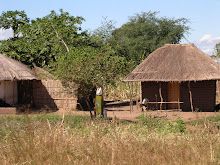Learning about Perma-culture
June 23, 2009
Tuesday we went to Tikondwe Freedom Gardens just north of Lilongwe. There, Daniel Chinkhuntha operates an exemplary example of perma-culture gardening. His late father, Dr. Livingston Chinkhunta, an economist, started with 10 square meters of almost unusable land given to him by a local chief. Because the land was filled with gullies and the rest was swamp, it took six years to actually begin farming. First the land was drained and the reeds dug out. They planted bananas along the river side to hold the banks and block flooding.
Today, it’s 30 hectares of beds, fed by a “natural” system of irrigation that brings water from the river during the dry season. The system also incorporates a way to prevent flooding and preserve water during the rainy season. All this is done with no mechanization. They practice organic gardening, using companion planting to protect crops from insects as well as making repellents from leaves and shrubs that can act to chase insects away.
Perma-culture, which means permanent agriculture, is organic and sustainable as opposed to agriculture dependent on fertilizers and pesticides that need to be repurchased each year, which means a farmer is actually working for someone else. Last year in Malawi, 19 billion kwacha provided a government subsidy for farmers to buy fertilizer that was produced in other countries, thereby depriving Malawi of using those resources in other ways. Last year a bag of fertilizer cost approximately $10, which cuts into any profit a farmer might make. A widespread use of perma-culture, using natural fertilizers and pesticides that come from the land and therefore cost nothing for the farmer, could preserve not only the land but also monetary resources of the country and give a higher profit for the farmer.
Daniel talks eloquently about food sovereignty as opposed to food sufficiency. The former is where you have surpluses and choices of products all year round. Food sufficiency means that a farmer may have an adequate yield but before the next harvest will have to buy from scarce supplies. He showed us several ways of holding water that raises the aquifer and provides water for irrigation.
Though none of us are farmers, we all gained new understandings of the processes that Daniel and his friend who works with him, Moses Kamanga, use to develop an Eden-like organization that sustains a large number of people in the area. We also saw the environmental and political issues that surround the whole concept of “permanent,” organic, sustainable farming.
